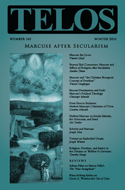Telos 165 (Winter 2013) is now available for purchase in our store.
 To choose Herbert Marcuse and religion as the topic for a special issue might seem strikingly anachronistic. Formed by the collapse of the Weimar Republic and the rise of Nazism, Marcuse worked in the OSS during the Second World War, and later, in his mature theoretical works, such as Eros and Civilization and One-Dimensional Man, he grew into the cultural critic who would become a prominent mentor of the student revolt of the 1960s, especially in the United States and Germany. This is a stirring narrative, no doubt, but does it not simply belong to another era? To be sure, historical distance is hardly an argument against intellectual inquiry, and one could certainly dedicate an issue to filling out a detailed account of how this philosopher became a public intellectual in the context of the upheavals of his age. Yet every historical study of the past also bears the marks of the present, including the question marks that punctuate our own, current queries in this issue of the journal. What does Marcuse have to say to us today? That consideration is always germane, but especially in Telos, which has set for itself the task of developing a critique of the contemporary.
To choose Herbert Marcuse and religion as the topic for a special issue might seem strikingly anachronistic. Formed by the collapse of the Weimar Republic and the rise of Nazism, Marcuse worked in the OSS during the Second World War, and later, in his mature theoretical works, such as Eros and Civilization and One-Dimensional Man, he grew into the cultural critic who would become a prominent mentor of the student revolt of the 1960s, especially in the United States and Germany. This is a stirring narrative, no doubt, but does it not simply belong to another era? To be sure, historical distance is hardly an argument against intellectual inquiry, and one could certainly dedicate an issue to filling out a detailed account of how this philosopher became a public intellectual in the context of the upheavals of his age. Yet every historical study of the past also bears the marks of the present, including the question marks that punctuate our own, current queries in this issue of the journal. What does Marcuse have to say to us today? That consideration is always germane, but especially in Telos, which has set for itself the task of developing a critique of the contemporary.


